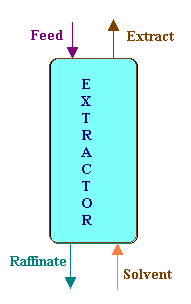 Acetic acid in the feed = 0.475 kg
Acetic acid in the feed = 0.475 kgA liquid containing 47.5% acetic acid and 52.5% water is to be separated by solvent extraction using isopropanol. The solvent used is 1.3 kg per kg of feed. The final extract is found to contain 82% acid on solvent free basis. The residue has 14% acid on solvent free basis. Find the percentage extraction of acid from the feed.
Calculations:
Basis: 1 kg of solvent free acid.
 Acetic acid in the feed = 0.475 kg
Acetic acid in the feed = 0.475 kg
Water in the feed = 0.525 kg
Entering acid has to come out in the extract and residue (raffinate) phases.
Let as denote the streams with the following representation.
Feed: F
Extract: E
Residue: R
Solvent: S
And the mass fractions of acetic acid (on solvent free basis) in various streams:
Acetic acid in the feed: xF
Acetic acid in extract: xE
Acetic acid in residue xR
And the mass fraction of acetic acid in the solvent is zero, since the solvent is a pure one.
Balance on acetic acid:
FxF = ExE + RxR
1 x 0.475 = E x 0.82 + R x 0.14
0.475 = 0.82 E + 0.14 R → 1
similarly writing the balance for water,
0.525 = (1 - 0.82) E + (1 - 0.14) R
0.525 = 0.18 E + 0.86 R → 2
solving equations 1 and 2,
E = 0.493 kg, and
R = 0.507 kg.
Amount of acetic acid in the extract = 0.493 x 0.82 = 0.4043 kg.
Percentage extraction of acetic acid
= 100 x Acetic acid in the extract / Acetic acid In feed= 100 x 0.4043/0.475 =
85.12Last Modified on: 01-May-2024
Chemical Engineering Learning Resources - msubbu
e-mail: learn[AT]msubbu.academy
www.msubbu.in